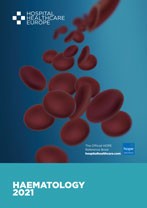A study among moderately ill patients hospitalised with COVID-19 has revealed how therapeutic as opposed to prophylactic doses of heparin appeared to offer a mortality benefit.
The use of a therapeutic rather than prophylactic dose of heparin provided a mortality benefit to moderately ill, hospitalised patients with COVID-19. This is the key finding of a study by researchers from the Departments of Medicine, and Laboratory Medicine and Pathobiology, University of Toronto, Canada.
The lung changes in patients with COVID-19 has been found to display marked microvascular thrombosis and haemorrhage.1 In addition, analysis of factors associated with a poor prognosis once infected with the virus include significantly elevated levels of D-dimer and fibrin degradation products.2 With anticoagulants such as heparin able to reduce D-dimer levels and some evidence of anti-inflammatory activity,3 these drugs might be of benefit to those hospitalised with COVID-19. However, the currently available evidence is somewhat mixed. For example, in a study of hospitalised, but not critically ill, COVID-19 patients, therapeutic doses of heparin increased the probability of survival,4 whereas in contrast, among hospitalised but critically ill patients, heparin was not beneficial.5
With some uncertainty over the possible advantages of heparin among those hospitalised with COVID-19, the Canadian team established the Therapeutic Anticoagulation versus Standard Care as a Rapid Response to the COVID-19 pandemic (RAPID) trial.6 The overarching aim of the trial was to determine whether therapeutic rather than prophylactic doses of heparin were superior in reducing the composite of admission to an intensive care unit (ICU), mechanical ventilation or death, in moderately ill hospitalised COVID-19 patients with elevated D-dimer levels. The RAPID trial enrolled patients who were admitted to a hospital ward (but not ICU) and not mechanically ventilated, with elevated D-dimer levels (above the upper limit of the normal range) within the first five days of admission. Patients were randomised 1:1 to therapeutic or prophylactic heparin with the former representing a higher dosage. For example, using enoxaparin, a therapeutic dose for a patient with a body mass index less than 40 would be 1mg/kg every 12 hours. In contrast, the prophylactic dose for a patient of the same weight would be 40mg every 24 hours. The primary outcome of the study was a composite of ICU admission, non-invasive or invasive mechanical ventilation or death up to 28 days. There were several secondary outcomes including all-cause mortality, ICU admission, ventilation-free days alive, need for renal replacement therapy etc.
Findings
A total of 465 patients with a mean age of 60 years (56.7% male) and with 42.3% of White ethnicity were randomised to either dose of heparin. The main co-morbidities included hypertension and diabetes and baseline D-dimer levels were 2.3-fold above the upper limit for normal.
The primary outcome occurred in 16.2% of those assigned to therapeutic heparin and 21.9% given a prophylactic dose and this difference was not statistically significant (odds ratio, OR = 0.69, 95% CI 0.43–1.10, p = 0.12). In contrast, all-cause mortality occurred in 1.8% of the therapeutic and 7.6% of the prophylactic groups (OR = 0.22, 95% CI 0.07–0.65, p = 0.006). There were no differences in secondary outcomes apart from the mean number of ventilation-free days although this was borderline (p = 0.042).
Commenting on their findings, the authors noted that while there was no difference in the primary outcome, the 78% lower mortality among those given therapeutic heparin was significant. Based on these findings, they concluded that therapeutic heparin is beneficial in moderately ill patients with COVID-19.
References
- McGonagle D et al. Immune mechanisms of pulmonary intravascular coagulopathy in COVID-19 pneumonia. Lancet Rheumatol 2020;2:e437–45.
- Tang N et al. Abnormal coagulation parameters are associated with poor prognosis in patients with novel coronavirus pneumonia. J Thromb Haemost 2020;18(4):844–7.
- Mousavi S et al. Anti-Inflammatory Effects of Heparin and Its Derivatives: A Systematic Review. Adv Pharmacol Sci 2015; doi: 10.1155/2015/507151.
- ATTACC. Therapeutic anticoagulation with Heparin in non-critically ill patients with COVID-19. N Engl J Med 2021;385:790–802.
- REMAP-CAP. Therapeutic Anticoagulation with Heparin in critically ill patients with COVID-19. N Engl J Med 2021;385;777–89.
- Sholzberg M et al. Effectiveness of therapeutic heparin versus prophylactic heparin on death, mechanical ventilation, or intensive care unit admission in moderately ill patients with covid-19 admitted to hospital: RAPID randomised clinical trial. BMJ 2021;375: n2400.





